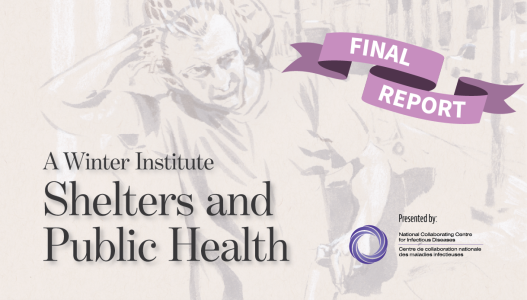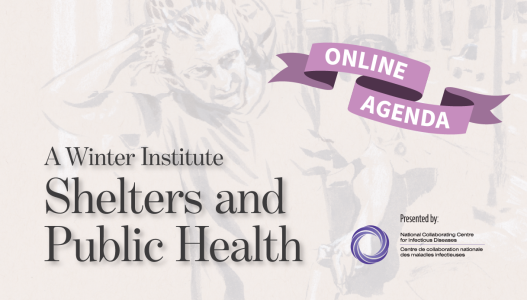
Population movements—from global migration to community displacement—contribute to the emergence and re-emergence of infectious diseases in Canada.
NCCID supports knowledge translation in fast-growing areas of refugee, evacuee, and migrant workers’ health to bring current evidence and information to public health practitioners and policymakers.
What’s New
Out of the ashes: Ashcroft Indian Band and the Elephant Hill wildfire – Insights for public health responses to long-term evacuation
This case study by the National Collaborating Centres for Public Health (NCCPH) explores the evacuation of Ashcroft Indian Band following the Elephant Hill wildfire in 2017. It includes insight into the health and social impacts of the evacuation, as well as the role of public health to support long-term emergency planning and recovery.
Shelters and Public Health: A Winter Institute Final Report
This report summarizes the Winter Institute, held on February 7-9, 2023 in Winnipeg. The event brought together over 100 community experts, policy makers and public health personnel from Northern Alberta, Saskatchewan, Manitoba and Northwestern Ontario, to explore the potential for partnerships between shelters and public health.
Shelters and Public Health: A Winter Institute
The purpose of this gathering was to explore how shelters and public health can work together to improve the health of people who use shelters. Watch recorded presentations and download event resources here.
Learning from Indigenous Leaders: Climate change and public health
This video-infographic series shares Indigenous perspectives on climate change, infectious disease, and public health.
Global Immunization Programs: A Summary and Consideration of Polio Vaccine Programs
This document provides a summary of the significant progress made in immunization globally, and a history of efforts towards polio eradication. The aim of this project is to explore various strategies used by other parts of the world and provide recommendation to improve Canada immunization programs, particularly following the COVID-19 pandemic. There are lessons to be learned for Canada from the experiences of other countries in providing mass immunization programs.
Combating Antimicrobial Resistance: Preserving antibiotics through community stewardship
In this presentation, we examine the successful interventions and outcomes from the Alberta and BC community antimicrobial stewardship programs. We finish with a discussion of next steps in making the case for other provincial community antimicrobial stewardship programs.
Resources
SUMMARIES: Public Health Responses for Long-Term Evacuation and Recovery
The long-term effects of natural disasters, evacuation, and prolonged displacement on individuals and communities largely go unrecognized and responsibilities for supporting recovery remain unclear. Responding to these knowledge gaps, the National Collaborating Centres for Public Health (NCCPH) led a joint project to clarify the role of public health to address the long-term health and social impacts of evacuations due to natural disasters.
PAPER: Slipping through: mobility’s influence on infectious disease risks for justice-involved women in Canada
This narrative review demonstrates that mobility between incarceration facilities and communities drives sexually transmitted and blood-borne disease risk for justice-involved women in Canada.
REPORT: Public Health Response and Health Status of Asylum Seekers: A Review of the International Literature and Implications for the Canadian Context
Limited data are available on the health status, level of access, and barriers to access to health care of asylum seekers who have entered Canada recently. This population of asylum seekers is unique in that most have spent extended periods of time in the United States, and how they may have impacted the asylum seekers’ health status is largely unknown. Current gaps in knowledge regarding health status, access to health care, and barriers to access of asylum seekers in Canada were identified.
VIDEO: Refugee Intake Recommendations for Physicians
As a quick resource guide for primary care providers, the Halifax Transitional Health Clinic for Refugees (Nova Scotia Health Authority) has developed succinct educational videos on: Initial Assessment, Women’s Health, Cultural Competencies, Mental Health, Immunizations, and Infectious Diseases.
SUMMARY: Screening and Vaccination Guide for Refugee and Immigrant Health
In 2011, the Canadian Medical Association Journal published detailed evidence-based clinical guidelines for immigrants and refugees as a gold standard for clinical and public health practitioners in Canada. NCCID has designed a summarized version as a quick review tool for clinicians. These guidelines, which can help public health stakeholders with planning and program development, provide information on comprehensive screening protocols, culturally appropriate services, and clinical recommendations for infectious diseases including vaccine-preventable illness.
WEBINAR: Data Management/Coordination and Refugee Health
November 16, 2016 presentation about one Ontario city’s recent experience with data management/coordination. The City of Hamilton Public Health Services team was responsible for creating a strategy on the fly, working with several agencies to collect, collate and share such basic data as the names, ages, sex and location/address of refugees, but also vaccination status, health assessment status and dental screening results. Archived copies available upon request.
WEBINAR: Refugee Oral Health: Interim Federal Health Plan Coverage
In this October 2016 presentation, our two presenters delved into refugee oral health, both in children and adults, with key findings from Manitoba and Saskatchewan.
PODCAST: Refugee Oral Health
Oral health and infection prevention is an essential part of public healthcare. The NCCID has developed short podcasts on oral infection in refugees, including unique needs and risk factors, the benefits of universal screening, and the Interim Federal Health Program.
Major Organizations and Key Links for Refugee Health
- Canadian Pediatric Society: “Caring for Kids New to Canada”
- Canadian Collaboration for Immigrant and Refugee Health (CCIRH)
- Canadian Centre for Refugee and Immigrant Health Care (CCIHC)
- Doctors for Refugee Care
- The College of Family Physicians of Canada: Refugee Healthcare





